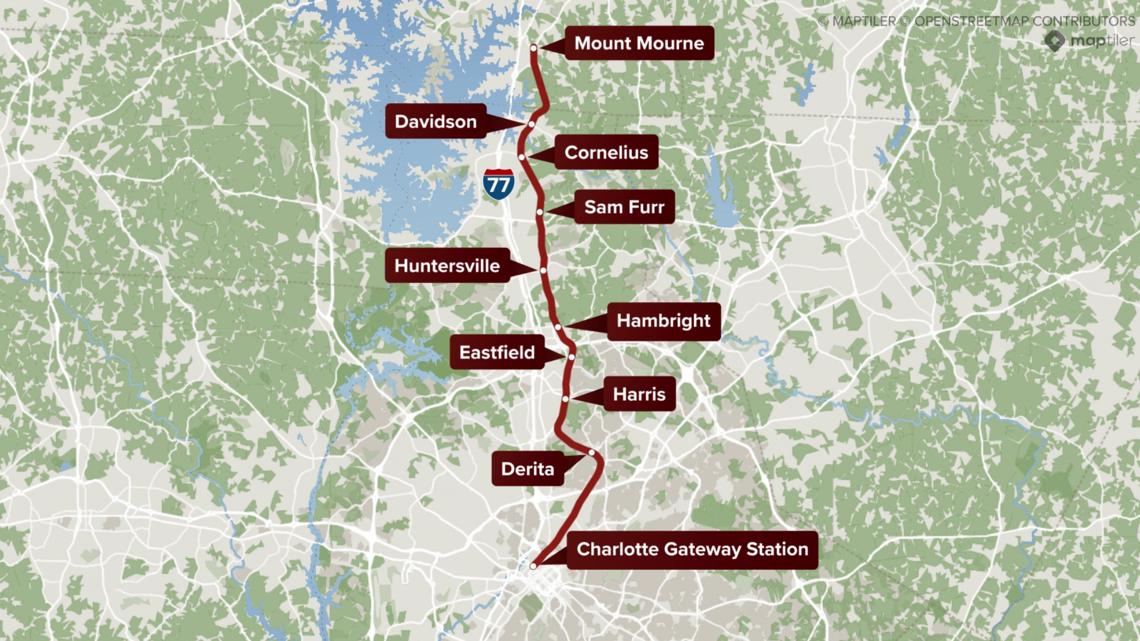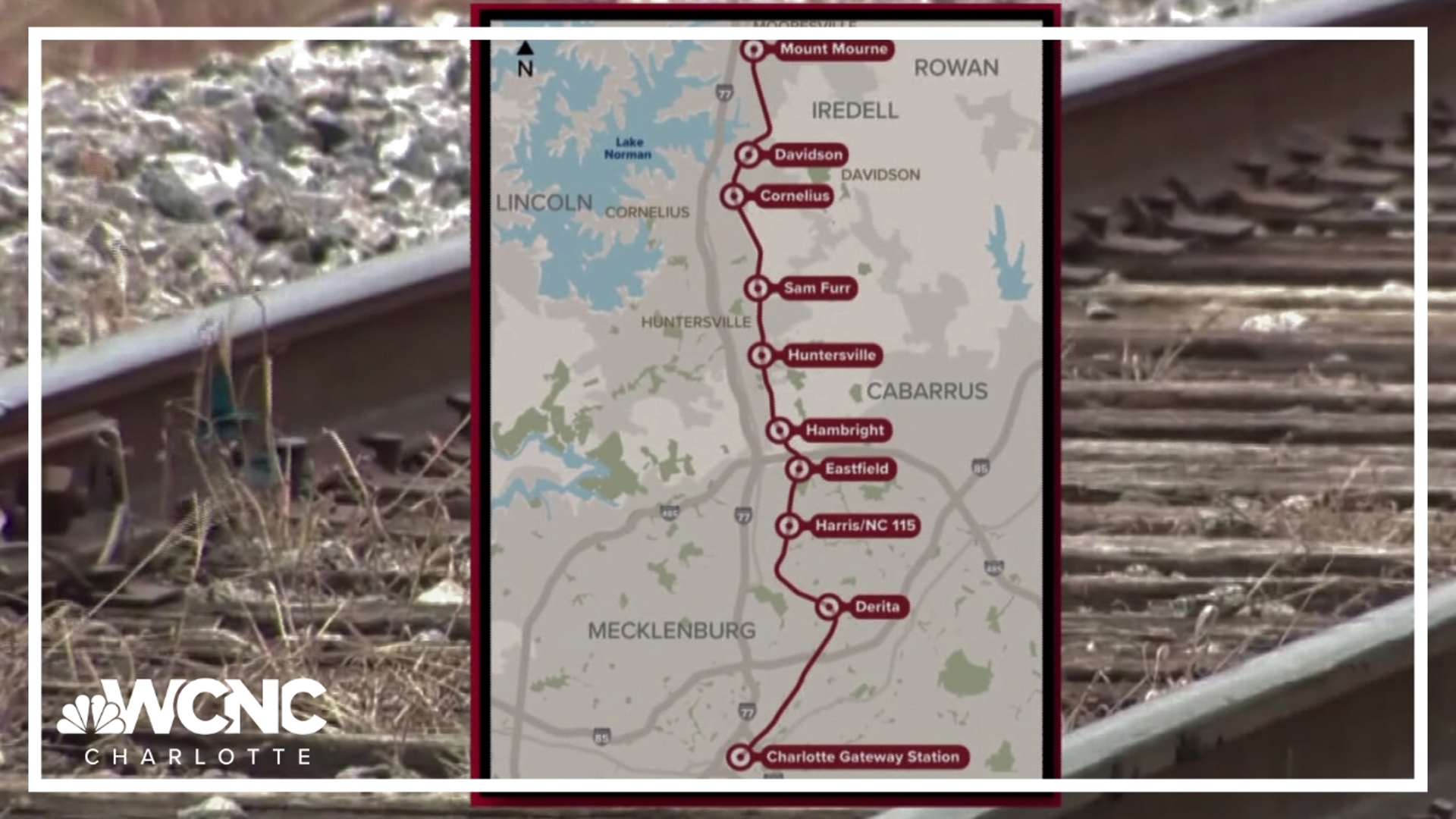CHARLOTTE, N.C. — The city of Charlotte voted Tuesday to acquire the railroad tracks needed for the city's future Red Line commuter rail service and support a sales tax to fund the purchase for the project.
Only one member of the Charlotte City Council - Tariq Bokhari - voted against the two resolutions. One of the measures was in support of the sales tax while the other approved the actual purchase of the necessary O-Line tracks from Southern Norfolk.
"The thought of raising taxes in our current economy on the heels of just having raised taxes," Bokhari said at the meeting. "It doesn't mean that that is not something we can contemplate. It just means we have to be precise."
The Red Line is expected to provide a first-of-its-kind commuter rail service between Uptown Charlotte and the northern suburbs, including the Lake Norman region.
Despite previous pushback from communities in East Charlotte, many spoke in favor of the plan at the meeting.
"Rejecting this compromise now because of the possibility that the silver line to Matthews would not be rail would very likely result in no new funding for transit," said Hope Wright, advocacy manager for Sustain Charlotte.
Charlotte leaders have been considering whether to spend $91 million to purchase existing Norfolk Southern tracks between Charlotte and the northern suburb of Davidson. The tracks, which the freight railroad calls the O-Line, are part of the 2030 regional transit plan.
As part of the plan, $74 million would go to purchasing the 22 miles of rail corridor between Uptown Charlotte and the Mecklenburg County line, with planned stops in towns including Huntersville, Cornelius and Davidson.
Another $17 million would be used to buy 1.6 acres of land along Graham Street, adjacent to the future Gateway Station.
Once built, Gateway Station is intended to link transportation services including Amtrak, the Red Line, the Gold Line street cars and buses.
To fund the plan and other transit projects, Charlotte City Council approved a resolution supporting a one-cent sales tax increase. If the North Carolina legislature approves the proposal for the sales tax, the plan is to have residents vote on whether or not to approve the sales tax in a November 2025 ballot measure.
Norfolk Southern set a Sept. 9 deadline with Charlotte for the purchasing of the tracks.
Some drivers say they are hopeful and welcome more transportation options.
“It would save some money and help people get back and forth to work and not having to be in all of that traffic,” Lonnie Sloan agreed.
The commuter Red Line would run right behind Barbers Ink in north Charlotte. Owner Ken Jones said the Red Line could mean more people in his chairs.
“I think it is a necessity for a city that is growing like Charlotte,” Jones explained. “I’m excited. Anytime you can help people get from Point A to Point B without having a car, especially with the city growing…. and putting the line through many of these small businesses… we can benefit from it.”
At last week's city council meeting, some council members were wary of these tight deadlines.
"Once we move forward on this tight timeline, we'll be holding the bag at that point," Councilman Tariq Bokhari said last week. "There's a lot of possible pros in that, but I have a lot of negatives and cons in my mind on how that could end up being a debacle."
The original Red Line plans included a stop in Mount Mourne, an Iredell County town located just south of Mooresville. However, without the support of both Iredell County and Mooresville, the city of Charlotte cannot move forward with that part of the rail purchase. The proposed agreement between Norfolk Southern and Charlotte preserves the ability to acquire this part of the line. in the future. If that were to happen, it would cost an additional $17.75 million.
The transit plan itself has been a source of debate. The town of Matthews voted to oppose the sales tax after it was announced the Silver Line train through east Charlotte would be eliminated from the regional transit plan. The Silver Line, envisioned as a light rail train similar to the Blue Line, could now operate as a bus rapid transit system in Mecklenburg County's eastern suburbs. Organizers cited budget constraints as the reason to not extend the Silver Line beyond propose services in western Mecklenburg County and Charlotte's city center.
"There's not enough money to pay for the plan and that’s been true for many, many years,” Brent Cagle, interim CATS CEO, previously said.
If all passes through the legislature, the city will open up the plan to input from the community and stakeholders as early as this fall. The goal is to come up with an updated plan in line with their official spending capabilities before it ends up on the ballot. However, there's no guarantee this will change anything for Matthews.
"It won’t change until the MTC (Metropolitan Transit Commission) votes to change it. What we’re going to do though in the meantime is come up with a proposed modified plan," Councilman Ed Driggs said.


Contact Jesse Pierre at jpierrepet@wcnc.com or follow her on Facebook, X and Instagram. WCNC Charlotte's Julie Kay contributed to this report. You can contact her at juliekay@wcnc.com and follow her on Facebook, X and Instagram.

